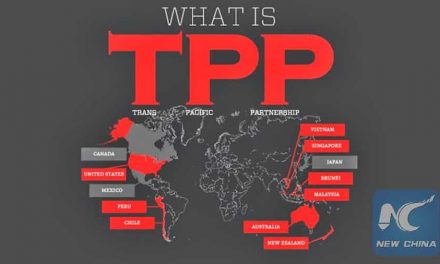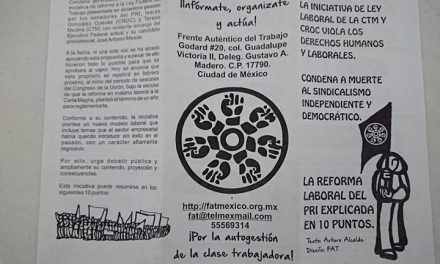Response to Joint Interpretative Declaration on CETA
Trade Justice Network
On October 5, 2016, a joint EU-Canada Declaration on CETA was released in Brussels and began to circulate publicly. The Declaration was supposed to be an official reply to the very specific amendments to CETA proposed by labour unions, parliamentarians, social justice organizations, and the public in both Canada and Europe. Instead of addressing these specific concerns, the Declaration completely ignores them.

And, in a display of arrogant condescension, the Declaration simply reiterates and clarifies what is already in the agreement, as if the various legitimate concerns that it purports to respond to have neither merit nor substance.
In light of this refusal to respond seriously to the substantiated and well-researched concerns of civil society, the members of the Trade Justice Network cannot accept this empty and meaningless Declaration as anything more than public relations. As well, as various legal scholars and trade experts have indicated, the Declaration is certainly not legally binding. This is consistent with the entire process of the CETA agreement so far. CETA was negotiated in secret, without any attempt whatsoever to include citizens, and has not taken into consideration the reasonable and legitimate amendments proposed by civil society.
Background
With the release of the CETA text on the government of Canada website, researchers, policy analysts, and interested citizens in labour unions, social justice groups, civil society organizations, and the public carefully read the agreement, identified specific areas of concern, and have repeatedly articulated these concerns in research documents, essays, and editorials. Furthermore, these specific concerns have been consistently raised with government officials in Canada and Europe in letters, public consultations, and in large-scale public protests and mobilizations, which in some cases numbered in the hundreds of thousands. At the same time, and all along, we have been proposing clear and very specific amendments to the CETA text.
Labour and civil society groups asked for specific amendments in the chapters dealing with the Investor Court System, the right to regulate, regulatory cooperation, public services, investment protection, public procurement, and labour and environmental protection. Proposed amendments to the text included language that would create binding enforcement mechanisms to protect workers’ wages and rights, to enforce health and safety standards, and to ensure environmental sustainability. Citizens in both Canada and the EU also demanded that the text be amended to remove all mention of the disturbing investor court system that bypasses our existing judicial system to give private foreign investors special legal privileges and to provide private foreign investors the extraordinary power to sue democratically elected governments for their policies and legislation.
The October 5 Declaration
In Canada, our specific concerns and proposed amendments were largely ignored by the original signatory to the agreement, Stephen Harper’s Conservative Party government. With the defeat of the Conservatives, and the election of a new government in October 2015, we were led to believe that these concerns would finally be taken seriously, and that the text could be amended. Hopes were raised when government officials signalled a willingness to listen to the specific criticisms raised in particular by the Canadian Labour Congress and its German counterpart, the DGB.
With the October 5 Declaration, it is evident that these hopes were decidedly misguided. The Declaration fails to address the shortcomings of CETA, and essentially ignores the concerns that have been raised. There is nothing whatsoever in the Declaration that acknowledges the specific demands and recommendations of civil society. There is no attempt at all to respond to proposed amendments, indeed none of the proposed amendments were even mentioned at all.
Instead the declaration touts the supposed virtues of CETA, and tries to depict it in an excessively optimistic light. The critics of CETA are served up nothing more than clarity and trite, empty reassurances: “a clear and unambiguous statement” of what was already agreed to.
Citizens and civil society groups asked for amendments. The response was stale platitudes. The Declaration simply reiterates the claims made about the supposedly wonderful social and economic benefits of CETA, without any even token attempt to validate those claims. They are true because they are stated to be true.
In other words, the Declaration is based on several patronizing assumptions: either citizens have not read the CETA agreement, or we don’t really understand what’s in it, or we just can’t see that it “promotes and protects our shared values.” The Declaration assumes that the critics are wrong, and that CETA doesn’t do what the critics allege. All these assumptions are egregiously flawed and deeply condescending.
And so the Declaration is weak and largely meaningless. And even if it wasn’t meaningless, in any case it is legally irrelevant, devoid of any legal content or significance. It does not even offer the pretext of interpreting the CETA provisions in legal terms. It does not alter or amend CETA in any substantive way, and it articulates commitments that are aspirational, non-binding, and lacking any effective legal enforcement.
For all these reasons, the Declaration has to be viewed as nothing more than a public relations exercise—an attempt to mollify critics of CETA, but not to take them seriously. In the words of Greenpeace, the Declaration “has the legal weight of a holiday brochure.”





